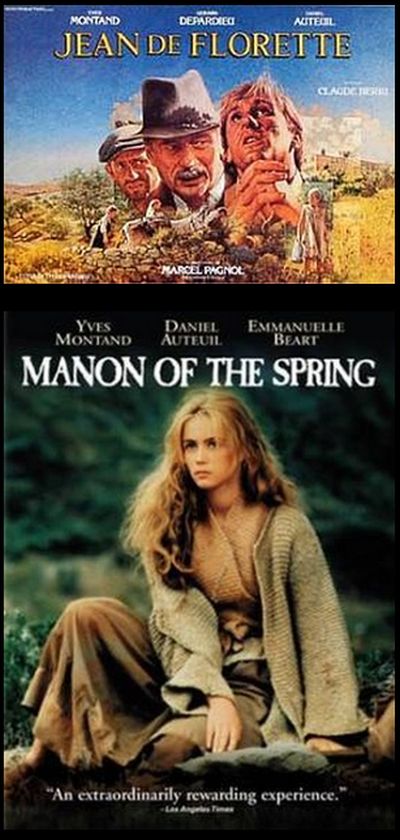Rating: A
Dir: Claude Berri
Star: Daneil Auteuil, Yves Montand, Gerald Depardieu, Emmanuelle Beart
 The first movie, Jean de Florette, is largely set-up: it depicts the struggles of rookie farmer Jean (Depardieu) to survive in the Southern French highlands, in the face of efforts by Cesar and his nephew Ugolin (Montand and Auteuil) to drive him off, so they can take over his property, which borders on theirs. They block up the spring which should feed water to his land, and Jean’s plans to raise rabbits fail despite his earnest struggles, eventually resulting in his death while trying to dynamite a well.
The first movie, Jean de Florette, is largely set-up: it depicts the struggles of rookie farmer Jean (Depardieu) to survive in the Southern French highlands, in the face of efforts by Cesar and his nephew Ugolin (Montand and Auteuil) to drive him off, so they can take over his property, which borders on theirs. They block up the spring which should feed water to his land, and Jean’s plans to raise rabbits fail despite his earnest struggles, eventually resulting in his death while trying to dynamite a well.
The second movie, Manon des Sources, takes place about a decade later. Jean’s daughter Manon (Beart) stayed in the hills, living a near-feral life as a goat-herder; Ugolin sees her bathing and instantly falls for her, but his love is not reciprocated since Manon knows he and his uncle blocked her father’s spring. She stumbles acorss the spring which feeds their property and that of the town, and realizes she has the perfect opportunity to extract revenge on those who were responsible for her father’s death.
At almost four hours, it’s a long, slow burn of a film [ok, while techically two, watching one without the other would be a much less fruitful experience], and is almost Shakespearean in its tragedy, since you can see the elements unfolding long before they come to fruition. Normally, this would be a weakness, but Berri turns it into a strength – you can’t tear your eyes off the screen and stop watching this dramatic equivalent of a road-accident. This was the film that propelled Beart onto our “Babes” list, but the change that comes over her as she realizes the power she holds, is as disturbing as her beauty is alluring.
Auteuil deserves especial credit too, taking a character motivated largely by greed and lust, and giving him a surprisingly sympathetic quality: by the end, you feel sorry for Ugolin, even as he fully gets his just deserts [yes – that is how it’s spelled, though it’s pronounced like the pudding]. If not quite the best pastoral tragedy, coming just behind Tess, it’s an immensely satisfying experience, with a double-whammy of an ending whose wallop is payoff for everything that’s gone before.
